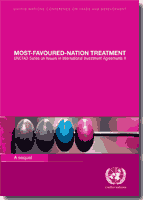Pink Series Sequel: Most-favoured Nation Treatment
The inclusion of most-favoured-nation (MFN) treatment provisions in international investment agreements (IIAs) followed its use in the context of international trade and was meant to address commitments made by States in free trade agreements (FTA) to grant preferential treatment to goods and services regarding market access. However, in the context of international investment that takes place behind borders, MFN clauses work differently.
In early IIAs, as national treatment (NT) was not granted systematically, the inclusion of MFN treatment clauses was generalized in order to ensure that the host States, while not granting NT, would accord a covered foreign investor a treatment that is no less favourable than that it accords to a third foreign investor and would benefit from NT as soon as the country would grant it. Nowadays the overwhelming majority of IIAs have a MFN provision that goes alongside NT, mostly in a single provision.
The paper contains an explanation of MFN treatment and some of the key issues that arise in its negotiation, particularly the scope and application of MFN treatment to the liberalization and protection of foreign investors in recent treaty practice.
Typically, MFN treatment provisions are used in different phases or stages of investment and can apply to either pre-and/or post establishment phases of investment, MFN treatment can apply to investors and/or to their investments and treaties usually contain exceptions, either systemic (regional economic integration organization (REIO) or taxation) or country-specific exceptions to pre-establishment commitments.
In practice, violation or breaches of the MFN treatment per se have not been controversial. However, an unexpected application of MFN treatment in investment treaties gave raise to a debate that has so far not found an end and that has generated different and sometimes inconsistent decisions by arbitral tribunals.
The issue at stake is the application of the MFN treatment provision to import investor-State dispute settlement (ISDS) provisions from third treaties considered more favourable to solve issues relating to admissibility and jurisdiction over a claim, such as the elimination of a preliminary requirement to arbitration or the extension of the scope of jurisdiction.
The paper provides policy options as regards the traditional application of MFN treatment and identifies reactions by States to the unexpected broad use of MFN treatment, and provides several drafting options, such as specifying or narrowing down the scope of application of MFN treatment to certain types of activities, clarifying the nature of "treatment" under the IIA, clarifying the comparison that an arbitral tribunal needs to undertake as well as a qualification of the comparison "in like circumstances" or excluding its use in investor-State cases.
















